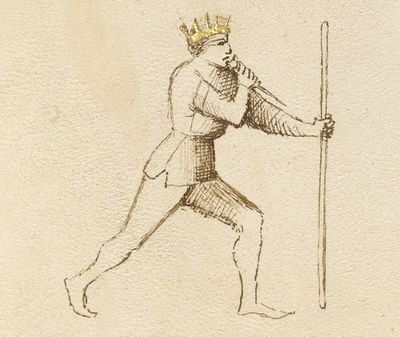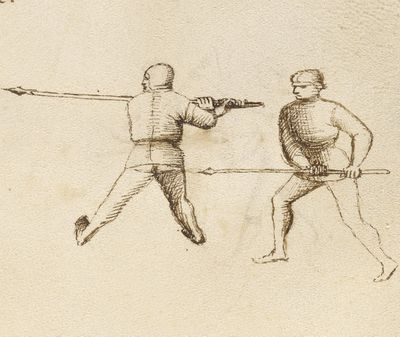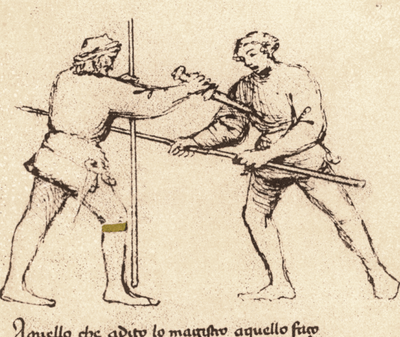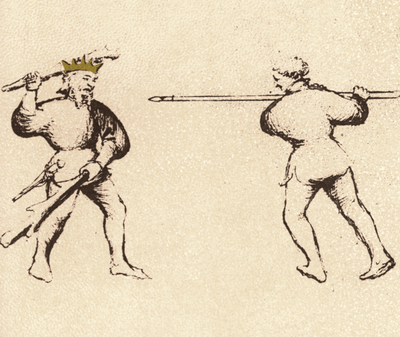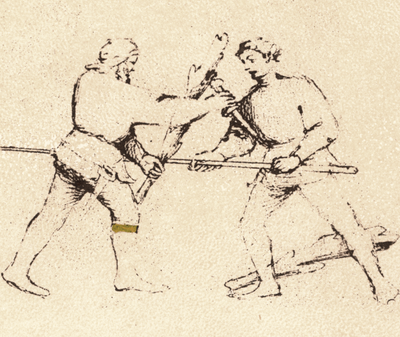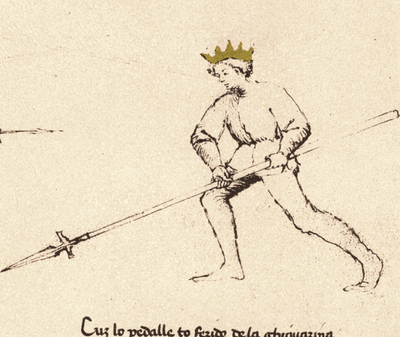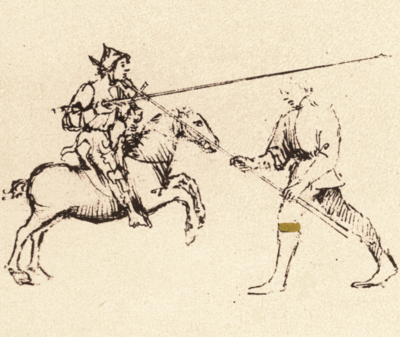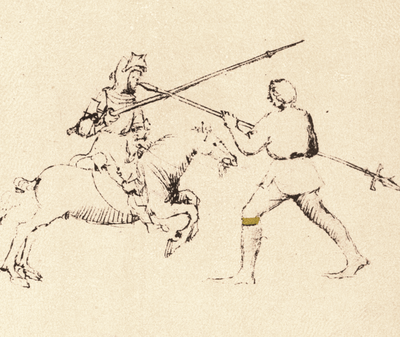|
|
You are not currently logged in. Are you accessing the unsecure (http) portal? Click here to switch to the secure portal. |
Fiore de'i Liberi/Spear vs. Other Weapons
Illustrations |
Illustrations |
Novati Translation |
Paris Translation |
Morgan Transcription (1400s) |
Getty Transcription (1400s) |
Pisani Dossi Transcription (1409) |
Paris Transcription (1420s) |
|---|---|---|---|---|---|---|---|
[11] In this way I wait with the dagger and with the staff: This master awaits these two with their spears. The Master, who is waiting with a staff and a dagger, sees that the first intends to attack with an overhand strike, while the second intends to strike underhand. Before one opponent attacks with his spear,[1] the Master tilts his staff to the right, similar to the guard Full iron Gate, turning himself without moving his feet nor lifting the staff off the ground. And the Master waits in this guard. As one opponent attacks, the Master pushes the spear aside with his staff to the left, using his dagger too if needed. Following that cover, the Master steps and strikes. Both attackers with their spears will discover that this is his defense. |
In the same way, holding fast to dagger and staff, For this play, which is of staff and dagger against a lance, the Scholar awaits him of the lance in the Full Iron Gate, turning his body but not moving his feet from the ground nor his staff toward the right side. And as he of the lance attacks the Scholar with his lance, the Scholar advances his left foot out of the way, beating and voiding the lance. And he steps close to him without delay and with the dagger he can strike him. This play he wants to make without fail. |
[18r-c] Ad aquesto partito si e de bastone, e daga contra lanza lo scolar aspeta quello da la lanza in tuta porta di ferro voltandose la persona, e non movendo gli pie di terra nel bastone inverso parte dritta. E come quello dal lanza tra al scolaro cum sua lanza. Lo scolaro acresce lo pe stancho fora de strada rebatendo, e schivando la lanza. E passa adosso de lui senza tarda, e cum la daga lo po ferire, questo zogo se vole fare a non falire. |
[31r-c] ¶ Questo magistro spetta questi[2] doi cum le lor lanze lo primo vol trar cum la punta sopra man, E l'altro vol trare sotto man. questo si vede. Lu magistro che aspetta cum lo bastone e cum la daga, quando uno di questi gli vol trare cum sua lanza, lo magistro piega lo baston in verso parte dritta zoe quasi in tutta porta di ferro voltando la persona, non amovendo gli pie ne lo baston di terra. E rimane lo magistro in guardia. E come uno di questi tra, ello rebatte la sua lanza cum lo bastone, e cum la daga s'ello bisogna a man stancha, e cum quello rebatter ello passa e fieri. E questa e la sua deffesa come troverete dredo questi doi de lanze. |
[15a-a] In tale forma cum la daga e cum el baston aspeto |
|||
[12] This is the play of the Master who awaits the two opponents with their spears. The Master has a dagger in his right hand, and with his left hand he holds a staff vertically in front of him. He can show you this play, but I will demonstrate it for him. If my opponent had known what to do he could have easily avoided my dagger strike. If he had widened his grip on his spear, and made cover under my dagger (that is, a crossing) with the back end of his spear, then this would not have happened. If he had known how to do this counter with his spear, he would have destroyed me. |
[31r-d] ¶ Eramo ambi doi disposti de ferire questo magistro ma segondo lo so ditto non poremo far niente. Salvo se noii no l'inganamo per questo modo zoe noi volteremo gli ferri dele lanze di dredo, e traremo cum lo pedale dela lanza. E quando ello rebattera lo pedale dela lanza, noii volteremo nostre lanze, E feriremo lo del'altra parte cum gli ferri dele lanze. E questo fara[!] lo suo contrario. |
||||||
[13] In that way that the previous Master has said, This is the play of the Master who waits for those two with spears. The Master has in his right hand a dagger, and he keeps a stave straight in front of him in his left hand. He can do the play in this way. And I do it for him in his place. But if this player knew how to do well, he could have avoided the dagger’s point. If he had lifted his hands with the spear, and with the rest of the spear which remains at the rear-end, he had covered under my dagger, which means crossing, it would not have happened to him. And he could have damaged me with his spear, if he knew how to do this counter to me. |
[31v-a] ¶ Questo si'e lo zogo del magistro che aspetta quelli doe cum doe lanze. Lo magistro a in la'mane drita una daga, e in la'mancha tene lo'bastone in pe dritto. denanzi defi[!].[4] Ello po fare in questo modo zogo. & io lo fazo per luii in so scambio. Ma se questo zugadore avesse sapiudo ben fare di questa punta de daga se posseva ben schivare, Se ello avesse largado le mane dela lanza, e cum lo avanzo dela lanza che avanza di dredo avesse coverto sotto la mia daga zoe incrosado, questo non gli saria incontrado. E cum sua lanza mi posseva guastare, si tal contrario m'avesse sapudo fare. |
[15a-b] Per quello modo che lo magistro denançi a'deto |
|||||
[14] I wait here with two sticks and a dagger: This Master defends with two cudgels against a spear, as follows: when the spear man approaches to attack, the Master with strikes at his opponent’s head with the cudgel in his right hand. Then he quickly strikes with the cudgel in his left hand so as to make cover against the spear, and then he strikes his opponent in the chest with his dagger, as is shown next. |
Here, I delay you with two clubs at the same time and also a dagger. |
[31v-b] ¶ Questo magistro fara deffesa cum questi[5] doi bastoni contra la lanza in questo modo, che quando quello dela lanza gli sara apresso per trare, lo magistro cum la mane dritta tra lo bastone per la testa di quello dela lanza. E subito cum quello trare, va cum l'altro bastone ala coverta dela lanza, e cum sua daga gli fieri in lo petto segondo ch'e depento a qui dredo. |
[15a-c] Cum duii bastoni e una daga aqui t'aspeto |
||||
[15] That which the Master has said, so do I do, I show the play of the Master before me. If he had known the counter, he would have obstructed me as follows: he would have lifted my hands with his spear by rotating it under my dagger, and in that way he would have been able to obstruct me and destroy me. So take this, since you know nothing. |
This deed having been done, [that] which the master now says will be told, |
[31v-c] ¶ Io fazo lo detto del magistro qui denanzi. Si lu contrario avesse sapudo, averissi mi fatto impazo per tal modo. Avere levado le mane cum la tua lanza sotto la mia daga. e per tal modo m'aresti possudo guastare. Habi questo che non sapesti niente fare. |
[15a-d] Aquello che a'dito lo magistro aquello faço |
[8v-a] ¶ Hoc operor factis, quod nunc narrando magister | |||
[16] Here are three opponents who wish to kill this Master. The first intends to strike underhand, and he carries his spear at the mid-point. The second carries his lance couched and fully extended. The third intends to throw his spear. They have agreed that no one will make more than one strike each. Also they will take it in turns. |
Here are three companions who want to strike this Master: the first wants to strike underhand and carries his weapon at the middle of the lance; the other carries his weapon in rest at the full of the lance; the third wants to throw his lance. And they are agreed that none should strike more than one blow per man, and that they should do it one by one. |
[8r-c] Aqui sono tri compagni che volemo ferire aquesto magistro lo primo vole ferire sotto man che porta sua lanza a meza lanza l'altro porta sua lanza a restada a tuta lanza, lo terzo lo vole alanza cum sua lanza E si a de patto che nesuno non debia fare piu de uno colpo per homo, anchora debano fare a uno a uno. |
[46r-a] ¶ Qui sono tre compagni che voleno alçider questo magistro. Lo primo lo vole ferir sotto man che porta sua lanza a meza lanza, L'altro porta sua lança restada a tutta lança, Lo terzo lo vole alanzare cum sua lanza. E si'e de patto che nissuno non debia fare piu d'un colpo per homo, Anchora debano fare a uno a uno. |
||||
[17] Even if Rolando and Pulicano were to make me an invitation with lances, Attack me one after another if you choose. For I am not going anywhere. I am ready and waiting for you in the Boar’s Tusk guard. When the spear is launched against me, whether fixed grip or thrown from the hand, I quickly step off line by advancing my right foot and stepping crosswise with my left foot, beating aside the spear that comes to strike me. Even if I were attacked a thousand times, my defense would not fail me even once. What I can do with my ghiavarina I could also do with a staff or a sword. The defense I make against the spear I could also make against a sword or a staff. My plays are shown next. |
If Roland, and likewise Pulicanus and the rude one, would attack me, the foot-soldier Come one by one whoever wants to come, and I will run from no one. Again, I am positioned in the Boar's Tusk to wait, and when the lance will come against me (carried or thrown by hand) I immediately avoid its path—that is, I advance my right foot out of the way and with my left I step on the traverse, beating the lance that comes to strike me such that of a thousand, I couldn't fail to beat even one. This I do with the spear, and with the staff or with the sword I would also do it, and the defense that I make which is against the spear, I could also make against the sword or the staff. I ask that you view the plays that are hereafter. |
[8r-d] Vegna a uno a uno chi vole venire, che per nesun di qui non per partir. Anche in dente de zenghiar sono posto per aspetare, quando la lanza contra me vignira portada overo de man zitada, subito io schivo la strada zoe che io acresco lo pe dritto fuora de strada, e cum lo stancho passo ala traversa rebatendo la lanza che mi vene per ferir. Si che de mille una non poria falir. Aquesto io fazo cum la chiavarina cum bastone cum spada lo faria. E la defesa ch'io Fazo le contra le lanze contra spada contra bastone aquello faria li mie zoghi sono di dredo, guardagli ch'io ven prego. |
[46r-b] ¶ Vegna a uno a uno chi vol venire, che per nessuno di qui non mi son per partire, Anche in dente di cenghiaro son presto per aspettare. Quando la lanza contra me vignira portada overo de mane zitada, subito io schivo la strada zoe che io acresco lo pe dritto fora de strada e cum lo stancho passo ala traversa rebattendo la lanza che mi vene per ferire. Si che de mille[7] una non poria fallire. Questo ch'io façço cum la ghiavarina, cum bastone e cum spada lo faria. E'lla deffesa ch'io fazo contra le lanze, contra spada e contra bastone, quello faria li mie zoghi che sono dredo. |
[34a-b] Si rolando e pulicano cum lanca me fesse invito |
|||
[18] I cut you in the head with my spear This is the play of the Master who waits with his ghiavarina in the Boar’s Tusk for an attack from the three on horseback. To enter into this play he steps off line and beats aside his opponent’s spear. And although he knows this play, I will demonstrate for him that my ghiavarina is so fast that I can strike my opponent with both thrusts or cuts against his head. |
Now that lance cuts your gloomy head with a great wound. This play belongs to the Master who came before, who awaits him of the horse with his spear in Boar's Tusk. In stepping out of the way and beating as he does, he enters into this play and so that it is understood, I do according to his word and with the edge and the point I could strike him in the head, since I carry my spear with such readiness. |
[8v-a] Aquesto zogo si e delo magistro ch'e denançi che aspetta cum la chiavarina quisti da cavallo in dente de zenghiar. In pasar fora de strada e rebater ch'ello fa ello intra in questo zogo, e perch'ello sia inteso, io lo fazo in suo logo. Che cum taglio e punta lo posso ferir[15] in la testa. Tanto porto la mia chiavarina ben presta. |
[46r-c] ¶ Questo si'e zogho del magistro ch'e denanzi che aspetta cum la ghiavarina quegli da cavallo in dente di çenghiaro in passar fora de strada e rebatter ch'elo fa ello intra in questo zogho. E per che ello sia inteso, io lo fazo in suo logo, che cum taglio e punta lo posso ferire in la testa, Tanto porto La mia ghiavarina ben presta. |
[34a-c] Cum mia ghiavarina te tagio la testa |
|||
[19] With the butt I have struck you with my spear, This is also a play made by the Master above, who waits in the Boar’s Tusk. In his place I can make this play instead of the other: if he beats aside my spear with his spear, I rotate my spear and strike him with the butt, which is capped with well-tempered steel. |
I, the clever one, strike your lips with this hard thrust, Again is this the play of the aforesaid Master who was previously in the Stance of the Boar. In his stead I do this, which he also could have done: when the lance is beaten, I turn my spear and I strike him with the butt (since it is well-tempered iron). |
[8v-c] Anchora e aquesto zogo dello ditto magistro che denanci in posta de zenghiar in suo scambio io fazo aquesto ch'ello po fare, quando la lanza e rebatuda Io volto mia lanza e si lo fiero cum lo pedale. Che aquesto ferro si e temperado e de tuto azale. |
[46r-d] ¶ Anchora e questo zogho del ditto magistro ch'e denanzi in posta de dente de zenghiaro, in suo scambio io fazo questo ch'ello lo po fare. Quando La lanza e rebattuda, io volto mia lanza, e si lo fiero cum lo pedale, che questo ferro si'e temperado e di tutto azale. |
[34a-d] Cum lo pedalle t'o ferido dela ghiavarina |
- ↑ Fiore actually writes “When the opponent attacks…” But the guard must be assumed before the attack, not during it.
- ↑ Changed from "o" to "i".
- ↑ A tiny note (M, perhaps) may have been removed above “agitando”.
- ↑ Probably meant to be "de si".
- ↑ Corrected from "e" to "i".
- ↑ Added later: "+ hoc ego".
- ↑ Corrected from "e" to "l".
- ↑ Added later: "nomen properum".
- ↑ Added later: "nomen properum".
- ↑ Added later: "de fresne".
- ↑ To the right, a multi-line note has been removed.
- ↑ Added later: "matreque?".
- ↑ There was a multi-word note here.
- ↑ Or “the precaution of the proud master moves me”.
- ↑ "e" changed to "r".
- ↑ Black light reveals there used to be a note here. The thing that looks like : is all that remains.
- ↑ Added later: "reparer renouvelir".

